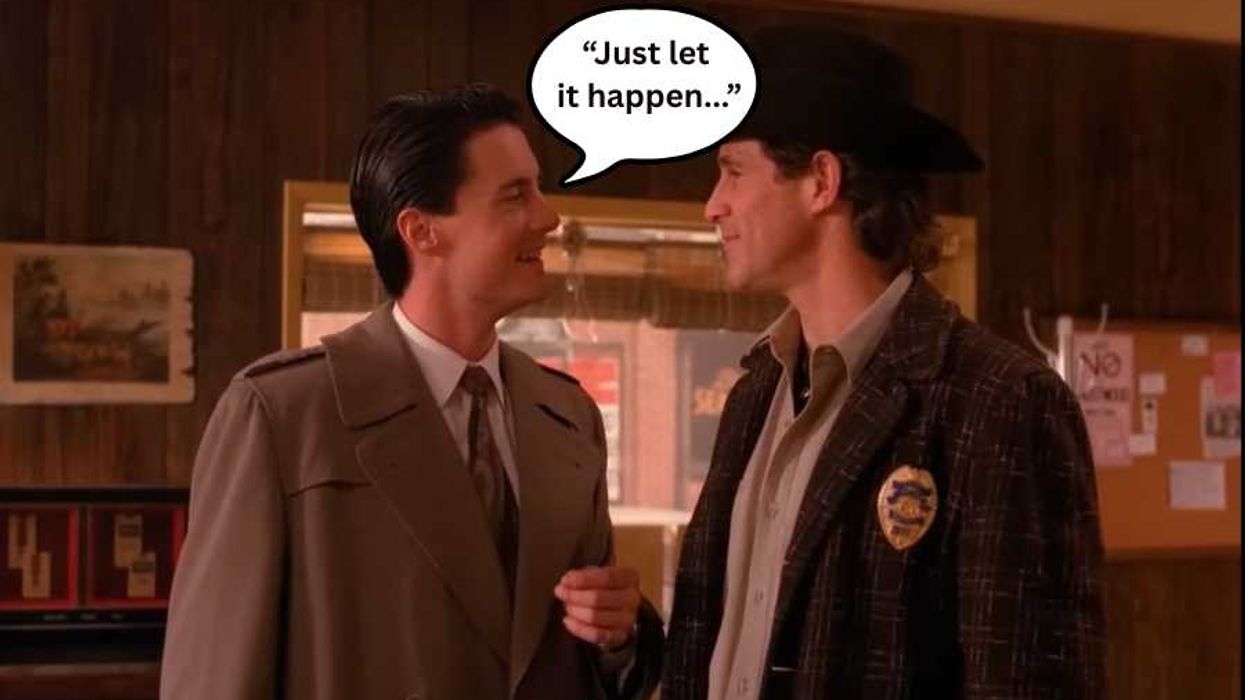One of the wisest philosophers in TV history is Dale Cooper: a sharp-jawed and somewhat mysterious FBI special agent with a fondness for "damn fine" coffee, a deeply cosmic interest in Tibet, and the uncanny ability to solve mysteries by throwing stones at bottles.
When Twin Peaks premiered back in 1990, there were many reasons to grow obsessed with this surreal, soapy murder-mystery—was any other show taking you into dream worlds filled with noir-jazz and reversed dialogue and eerie red curtains? But you probably kept coming back because Kyle MacLachlan, amid all the strangeness, imbued Agent Cooper with a rich humanity. You didn’t always understand him, but you still felt like he could teach you something.
There are many life lessons woven into Twin Peaks, but the most famous is probably from Season One’s seventh episode, "Realization Time," written by Harley Peyton and directed by Caleb Deschanel. The scene in question takes place in the show’s famous Double R Diner, where Cooper and the titular town’s sheriff, Harry S. Truman (Michael Ontkean), arrive on business. Before they leave, waitress Shelly Johnson (Mädchen Amick) asks the investigative duo if they’d like some coffee. Truman, in a hurry, tries to refuse. But a smiling Cooper, perhaps knowing they both need this small win, takes charge.
- YouTube www.youtube.com
"Harry," he says, placing his hand on his colleague’s shoulder, "I’m going to let you in on a little secret. Every day, once a day, give yourself a present. Don’t plan it. Don’t wait for it. Just…let it happen. It could be a new shirt at the men’s store, a catnap in your office chair, or two cups of good, hot, black coffee—like this."
That quote has lived a full life beyond the show, popping up routinely on Reddit threads and forums. And it sure feels like solid wisdom—if we’re able to reward ourselves daily with some kind of dedicated dopamine rush, even if it’s from something small like a tasty beverage or 10 minutes of peaceful quiet in nature, doesn’t that make life feel more…alive? If we’re stuck in rigid routine, it’s hard to feel excitement in the little things.
But what do therapists think? Is this just a clever piece of TV writing, or is it something more profound that we should try to implement in our lives, when possible? To get some insight, I asked a handful of professionals. Here’s what I learned.
Sarah Herstich, a licensed trauma therapist and owner of Reclaim Therapy in Horsham, Pennsylvania, tells GOOD that this quote, from a nervous system perspective, "isn’t just cute TV banter."
"What Cooper's describing is basically micro-moments of regulation and presence," she said. "When we pause to notice something good, even something tiny, we're interrupting the stress response cycle. That catnap, that coffee, the feel of a new shirt? They can be anchor points that pull us back into our bodies and out of the mental loop of everything we still need to do. The 'don’t plan it, don't wait for it' piece is what makes this actually useful. So much of my work is helping people stop living three steps ahead or stuck rehashing yesterday. When you're looking for a small present for yourself in the moment, you have to be here. You have to notice. And noticing what feels good right now is a skill most of us have completely abandoned."
- YouTube www.youtube.com
Herstich says things get "complicated," however, for people in "survival mode or feeling stuck in depression."
She adds, "[They] might read this and think 'Great, but nothing feels good.' I get that. But even then, the practice of scanning for something that doesn't make you feel worse? Still worth it. It's less about chasing a feel-good moment and more about retraining your system to look for neutral-to-okay instead of constantly bracing for the next bad thing. So, as a trauma therapist, I do think it's practical advice. But it takes a softness toward yourself that most people don't naturally have. Which is probably why it sounds so easy and feels so impossible."
Kai Korpak, a licensed clinical social worker at Best Therapies in Chicago, says that our beloved special agent seems to be advocating for "practicing mindfulness…staying in the present moment, and practicing acceptance." He adds, "This allows one to be in the moment while not waiting and being reactive, rather letting things happen naturally."
Meanwhile, let’s consult Lisa Shows, a self-described "Twin Peaks fan" who is also a licensed professional counselor and the owner of Bright Potential Counseling in Flagstaff, Arizona.
"I love Dale Cooper and think this is good advice," she says. "There is a type of therapy called 'Problem-Solving Therapy' (a pretty on-the-nose, Behavioral Psychology technique), and part of the treatment is called a 'daily pleasurable activity.' This is purposeful because with depression or anxiety, we tend to withdraw from pleasure, and this practice helps to counteract that. Additionally, it helps to increase positive reinforcement. The theory is that our mood is shaped in part by our behavior. It helps to reduce stress and thus we can think more clearly. It also helps to build a sense of mastery and control, which are important for mental health. And finally, this act, especially if it is a daily structured one, helps clients to re-establish positive routines."
Dale Cooper: Special Agent, unofficial therapist. Now, if you’ll excuse me, I have some rocks I need to hurl at bottles.
- YouTube www.youtube.com


















 Counterintuitively, social media can make you feel more bored and lonely.
Counterintuitively, social media can make you feel more bored and lonely. Talking about what you’ve read can add a social dimension to what can be a solitary activity.
Talking about what you’ve read can add a social dimension to what can be a solitary activity. 
 A flight attendant closes the overhead binCanva
A flight attendant closes the overhead binCanva Gif of Larry David trying to put his luggage in overhead compartment via
Gif of Larry David trying to put his luggage in overhead compartment via 
 Dog owner pets their dogCanva
Dog owner pets their dogCanva Gif of a sad looking pug via
Gif of a sad looking pug via 
 Volunteer work.Photo credit
Volunteer work.Photo credit  Putting the puzzle together.Photo credit
Putting the puzzle together.Photo credit  Woman and her equations.Photo credit
Woman and her equations.Photo credit  A colorful mind.Photo credit
A colorful mind.Photo credit  A happy business team.Photo credit
A happy business team.Photo credit 

 A happy entrepreneur at workCanva
A happy entrepreneur at workCanva
 A car with LED headlightsCanva
A car with LED headlightsCanva